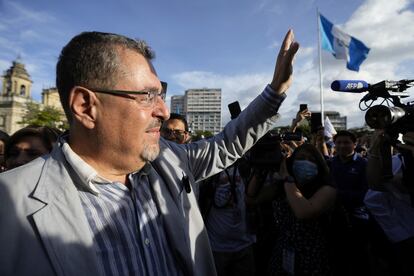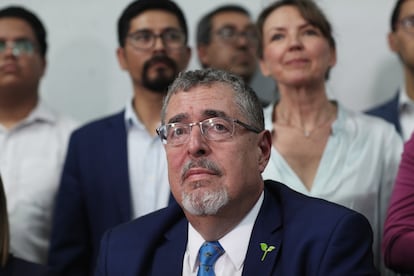Bernardo Arévalo, candidate for the presidency of Guatemala: ‘Our task is to unify the entire population that is fed up with corruption’
In an interview with EL PAÍS, the candidate for the Seed Movement – a center-left political party – affirms that, in the runoff election scheduled for August, he will seek alliances with ‘all who have a constructive attitude and who are against corruption’

These are hectic days for Bernardo Arévalo de León. Since last Sunday, this calm 64-year-old man – who was born in Uruguay, when his parents were exiled from their native land – has made a flurry of appearances. He’s been holding rallies and giving non-stop interviews to fine-tune his presidential campaign: he unexpectedly made it to the runoff election on June 25, after coming second in the first round. On August 20, Arévalo will face off against Sandra Torres, who served as first lady of Guatemala from 2008 until 2011.
Torres – who was a candidate for the National Unity of Hope (UNE) – secured nearly 16% of the vote in the first round. However, more than one million Guatemalans chose to cast a null ballot, rejecting all candidates in a process that saw the Supreme Electoral Tribunal eliminate three popular candidates from the running, all of whom were critical of Guatemala’s political establishment. The amount of blank and ruined ballots exceeded the number of votes that any one candidate received.
Close behind Torres was Arévalo, the founder of Movimiento Semilla (the Seed Movement) – a progressive party that emerged in the heat of the anti-corruption protests in 2015. He secured nearly 12% of the vote on the first ballot, defying all the polls, none of which gave him more than 3%. For Arévalo, achieving this result was an “extremely pleasant surprise.” However, it was a reaffirmation of the support that his team saw in the streets. It was the result of the efforts of many Guatemalans, who are convinced that, in a state riddled with corruption, a change within the system is possible.
In the runoff elections, the son of President Juan José Arévalo (1945-1951) wants to unite the forces of all outraged Guatemalans. Upon reaching the presidency – now occupied by Alejandro Giammattei – he says that he will put the fight against corruption at the top of his agenda. This, he says, will allow him to do what’s most important: bring development to an extremely unequal country. Of the 17.6 million inhabitants of Guatemala, close to 60% live below the poverty line. “If we don’t rescue the institutions from corruption, they will not be able to function to take development as far as possible,” he points out.
To achieve this, Arévalo will have to overcome a tough campaign. Torres has left behind her social democratic roots, in order to capture the vote of the most conservative citizens. “They’re trying to raise the flag of communism… they’re saying that [we’re] going to expropriate your house, that we’re going to take this and that from you. Or, on the other hand, [they’re raising the] flags of the cultural war,” he notes, referring to his rival’s coalition.
He assures EL PAÍS that the Torres campaign will try to distract the population from what’s fundamental: whether Guatemala is “a viable country with institutions that respond to collective interests, or a state in the hands of criminal groups that are only seeking personal enrichment.”

When asked about who he sees as models for governance in the Latin American left, Arévalo mentions José Alberto Mujica and his Frente Amplio (Broad Front) party in Uruguay, lauding them for their “strongly established principles of social justice, within a framework of respect.” He feels that these values are needed in a Guatemala that is polarized and thirsty for governability.
To win on August 20, the Seed Movement will need to attract the vote of Guatemalans who are fed up with corruption… but these voters will have to come from different points across the political spectrum. The task of governing on the basis of hope and change isn’t so simple, as demonstrated by the cases of Gabriel Boric in Chile or Gustavo Petro in Colombia. To avoid disappointment, Arévalo claims that his party’s proposals are “as realistic as possible.”
“We’ve been very responsible in analyzing the [political] context, the possibilities and the resources to be able to identify what’s reasonable to put on the table,” he said in an interview with EL PAÍS via video call on Wednesday, June 28, three days after the first round of the elections.
Question. Taking into account how the political system is configured in Guatemala, the second round will not only see you face off against Sandra Torres, but probably also against the parties that want to maintain the status quo. You’re very clear about who you won’t forge alliances with – what’s your red line?
Answer. What we’re very clear about is that our vote [in the first round] was a protest vote against the system, [just as] the null vote was a protest vote against the system. What we’re doing is representing the Guatemalans who, in the first round, decided to stand up to the system, choosing one of the anti-system alternatives. The null vote was the vote of the people who didn’t believe that this could be done from within the system – they preferred [to ruin their ballots] as a strategy to generate a clean break.
For us, our task is very clear: we need to capitalize on the entire population that is fed up with the system, with corruption. Those who are tired, who – until now – had given up on politics.
[I also experienced] this weariness on a personal level, without participating in a political way. But now, I decided to take a step forward. Our alliance will be with all the people who clearly know that what we have to do is dismantle the system of corrupt political co-optation, so that we can start putting our institutions to work and achieve national development.
Q. A million or so people chose to participate in the first round… but they did so against the system, with blank or spoiled ballots. Have you established any contact with these voters yet? For instance, have you spoken with Thelma Cabrera (a major Indigenous leader)?
A. We’ve always had channels of communication with her and with other groups. But we’re clear that the [electoral] mobilization is going to be a mobilization of citizens who aren’t necessarily politically affiliated. I’m going to say it in a way that sounds rhetorical and banal, but really, the alliance that we have to seek is an alliance with the people – an alliance with the people and not necessarily an alliance with systems, with parties.
Q. You are a mainly urban party, made up of people who’ve had access to education and are more white than Indigenous. How are you going to reach out to the diversity of the country, so that the people who have felt abandoned for so long can identify with you? In those places, Sandra Torres has a lot of support, because the residents remember the aid plans from ten years ago, during her husband’s administration. This timeline gives an idea of the level of abandonment...
A. In fact – while they were not elected and although our vote was limited – in most Indigenous areas, we had Indigenous leaders heading up our (legislative) lists in Quetzaltenango, in Totonicapán, in Quiché, in Chimaltenango… our candidate in Chimaltenango, Raúl Cuá, did manage to win his seat. In Sololá, in Alta Verapaz... there have been many Indigenous [candidates from our party] who are involved in the struggles of their communities. That is to say, we’re not going to show up with our urban and mestizo (mixed) faces in those cities if we don’t [build a relationship] with these compañeros and compañeras, who are now going to create this dialogue. Furthermore, we have contact with a series of Indigenous social organizations – with which we’ve always had contact – and [this relationship] is now renewed in terms of the new political context.
Q. You speak against the corruption that has implanted itself within Guatemala’s structures. Aren’t you afraid that the judiciary could disqualify you, as occurred in the first round with some political parties?
A. It’s clear that [the judiciary] is a tool that the [establishment] hasn’t hesitated to use in the past. In fact, we know that there’s a spurious case that they’re setting up… we know that the system isn’t going to remain calm and meekly accept the arrival of a party that they hadn’t seen coming. [They’re not just going to simply] lose control of the executive branch, which is key for them to [maintain] corruption. We know that they will try everything [to stop us].
Q. If you were to win on August 20, you will have a very difficult government, with only 23 members of Congress from your party (out of 180) and with courts that – according to complaints – are co-opted. How can you govern with the system against you? And to what extent can you maintain your principles while forging alliances?
A. We’re simply going to make alliances with all the people who have a constructive attitude and who are against corruption. What we’ve said is that we’re not going to make alliances with the corrupt, with criminals and with violent authoritarians. Now, obviously, it’s going to be an extremely difficult situation, because the co-optation of the state has reached profound levels.
A central part of this economy of corruption revolves around the executive branch. By subtracting that central element, the incentives for corruption are going to drop, that logic is going to start to crumble, because a lot of what happens in terms of the use of state institutions – from the approval of corrupt laws to the persecution of critics and harassment of dissidents – comes from the presidency. It’s from there that the state infrastructure works and from where all operations are carried out. This piece – which is central to the operation of the [state’s] mechanisms – is going to [change]. And, from there, we’re going to start a fight that we know will be very difficult… we’re going to have to genuinely have the support of the population. [The people] will see that we’re waging a fight that responds to the aspirations of everyone who is fed up with this system.
Q. On Sunday, you said that you would open the door to exiled judges and prosecutors, so that they could return and work for their country. But from the executive branch, how would you ensure that these individuals have guarantees that they aren’t persecuted by the courts?
A. It’s true, we from the executive branch cannot intervene, we cannot interfere in the affairs of other state agencies. [Guatemala] is a republic, with separation of powers. So, we’re going to open the doors for them, but of course, there are situations of a legal nature that will determine when and how they’ll be able to return to the country. Now, once again, we must remember that the reason why these people are being persecuted is fundamentally due to the pressure from the presidency, because [the government] was annoyed by their investigations into corruption. When this pressure disappears, then it’s very likely that the incentives will begin to change – the revision of legal processes can be requested. Some of these cases [will fall apart through the traditional legal avenues] and [if I am elected], there will no longer be an administration behind this harassment, persecution and criminalization.
Q. In the case of José Rubén Zamora – the journalist and director of the newspaper elPeriódico – he was sentenced to six years in prison, though there have been many failures in the legal process and he has not had the right to a fair defense. Yet, there’s already a sentence. What do you think of this case? What possibilities would there be that Zamora receives a fair review of his case under your administration?
A. This is precisely an example of the extent to which this corrupt political system is willing to use any tool to eliminate problems [that impede] its smooth operation. And, very clearly, the case of José Rubén – who has been a constant critic of government corruption for a long time – makes the sentence not only a punishment for his [courage], but also a warning from the system to all those people who – either from journalism, or from other spaces of free expression and criticism – are threatening the interests of these political-criminal elites.
We see [this case] as serious, but, again, it occurs fundamentally due to participation of the executive branch in this entire plot. That’s what we’ll get rid of – we have a completely different position. Now, we from the executive branch cannot [interfere]. What we’re going to do is call for a review, so that – once the scenario has changed – the issue can be understood from within the proper legal system, [so we can see what] can be done to correct a sentence that is clearly the product of the political co-optation of the judiciary.
Q. What would your government’s relationship with businessmen be like?
A. We don’t have problems with employers. On the contrary, we believe that Guatemala needs many more. We want – above all – a multiplication of small and medium businesspeople, who are currently generating 80% of employment. In our platform, we’ve clearly identified the measures we’re going to take to promote entrepreneurship: we’re going to work with different economic sectors, we’re going to create venture capital so that the economic sectors begin to incorporate technology into production processes. What we are against is the economy of privileges – the economy where [wealth] is built or maintained based on the level of influence and political control that one has, from the business side, over a political system that generates influence-peddling.
We’re against the CACIF (the main chamber of commerce in Guatemala), as it has positioned itself precisely at the center of this economy of privileges. But we have always said that the CACIF is simply one of many business organizations… we want more productivity in the country, because the taxes that will come out of this productivity will allow us to attack poverty at all levels. And who will generate productivity? Entrepreneurs. Our job is to create conditions for business development, because this is what will give us the funds to be able to invest in paying off the enormous social debts that the state owes its population.
Q. What would happen if Sandra Torres wins on August 20?
A. We would have a continuation of this process of gradual deterioration of democratic institutions, of deepening corruption. This election is a crossroads where there is clearly the possibility of starting over, turning the wheel and getting out of this [state of] deterioration, of authoritarianism… [of halting] the loss of democracy, loss of freedoms, the continued impoverishment of the population, deepening corruption… what’s on the table in this election is whether we can move on. Otherwise, we’ll continue in this swamp.
Sign up for our weekly newsletter to get more English-language news coverage from EL PAÍS USA Edition
Tu suscripción se está usando en otro dispositivo
¿Quieres añadir otro usuario a tu suscripción?
Si continúas leyendo en este dispositivo, no se podrá leer en el otro.
FlechaTu suscripción se está usando en otro dispositivo y solo puedes acceder a EL PAÍS desde un dispositivo a la vez.
Si quieres compartir tu cuenta, cambia tu suscripción a la modalidad Premium, así podrás añadir otro usuario. Cada uno accederá con su propia cuenta de email, lo que os permitirá personalizar vuestra experiencia en EL PAÍS.
¿Tienes una suscripción de empresa? Accede aquí para contratar más cuentas.
En el caso de no saber quién está usando tu cuenta, te recomendamos cambiar tu contraseña aquí.
Si decides continuar compartiendo tu cuenta, este mensaje se mostrará en tu dispositivo y en el de la otra persona que está usando tu cuenta de forma indefinida, afectando a tu experiencia de lectura. Puedes consultar aquí los términos y condiciones de la suscripción digital.









































